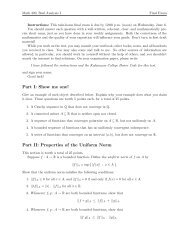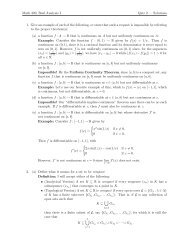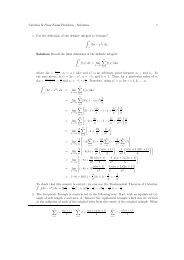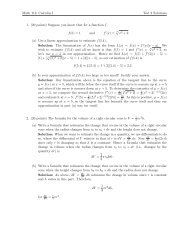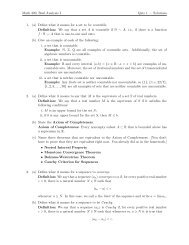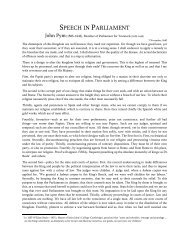Create successful ePaper yourself
Turn your PDF publications into a flip-book with our unique Google optimized e-Paper software.
FACTORY AT JOAR<br />
In July 1730, the <strong>Royal</strong> <strong>African</strong> <strong>Company</strong> hired Francis Moore (c. 1708–c. 1756) to serve 3 years as a writer<br />
(clerk) in their outposts along the Gambia River. After a two-month voyage, in November 1730 he<br />
arrived at James Fort, the <strong>Company</strong>’s headquarters at the mouth of the Gambia. In September 1731, the<br />
<strong>Company</strong> dispatched Moore to join William Roberts at Joar, a small factory about 100 miles up-river. A<br />
few months later, they received these instructions.<br />
James Fort (Gambia), 22 January 1731 /1732<br />
Our last to you, Mr. Roberts, was of the 15 th instant, which acknowledged the receipt of your letter of the 7 th ,<br />
with your books of accounts, all which we have perused, but have not as yet had time to give you our<br />
observations thereon.<br />
This now goes by the same sloop, Captain John Boys, and serves to cover invoices of sundry goods and<br />
merchandize, amounting to 4674 bars, 4s 0d, which we hope will come safe to hand and prove to content, they<br />
being in all respects agreeable to your own intent.<br />
We are in the first place to acquaint you, Mr. William Roberts, that whereas the <strong>Company</strong>, in their letter to us,<br />
have signified their pleasure concerning Joar Factory that it, being a place of great trust, ought not to be left<br />
under the direction of one factor. You are hereby required to admit Mr. Francis Moore to be your colleague and<br />
from the receipt hereof to be with you jointly concerned in the management of the <strong>Company</strong>’s affairs. And for<br />
the better carrying on the same, you are to observe that nothing be transacted but what shall first meet with the<br />
approbation of the other; for as you are equally concerned and accountable, so it is but reasonable that each<br />
person should have it in his power to prevent anything being done that to him shall seem to be to the prejudice of<br />
the <strong>Company</strong>.<br />
You are therefore on receipt hereof (if you, Mr. Moore, are not satisfied that the remains in store do correspond<br />
with Mr. Roberts’ books from the 1 st instant) to take an inventory of all the <strong>Company</strong>’s effects at the factory first<br />
and which, if it should be thought necessary to be done, you are hereby required and directed that Captain Boys<br />
be there present in order to enable him to sign and testify to us that the same is an exact and just inventory of all<br />
the <strong>Company</strong>’s effects there.<br />
The <strong>Company</strong> has highly reflected and resented our conduct for suffering and passing by, without showing due<br />
resentment (by discharging all such factors and others in the service, and sending them home with such<br />
characters as they deserve, in order that they recover the damages of their bondsmen) to all those who have<br />
squandered away and have been lavish of their capital goods, even in trade, and other ways appropriated them to<br />
their own uses; to such who have run themselves in debt, particularly those who have left powers of attorney<br />
behind them, and to those in particular who are at out factories, such as formerly made good remittances of dry<br />
goods and of late none; them, in particular, the <strong>Company</strong> absolutely commands us to use with no show of<br />
compassion, nor admit any excuse or pretence, but forthwith to send them home as aforesaid, they being but too<br />
well assured that the reason proceeds from the factors applying them to their own uses. They also complain very<br />
much of those that give their money without showing good reason for so doing, and they require for the future<br />
that all such be placed to the factor’s accounts, and in default of which they will place the same to ours. These<br />
strict injunctions of the <strong>Company</strong>, and the reproaches we have received, carrying with it a show of justice as you,<br />
Mr. Roberts, cannot but allow. Witness your own books lately come down, to say nothing of those at Geregia,<br />
where above 120 bars were deficient more than you cared to own, and for which you gave Mr. Payzant the<br />
enclosed note. We say those reproaches, etc. oblige us to acquaint you that no excuse will avail with us for the<br />
future in case you relapse into any of those proceedings before-mentioned; and that there shall be no room left to<br />
plead any excuses, we repeat to you the following orders, which you, Mr. Moore, must also observe for your<br />
future government, viz.:
1. You are to observe that the keeping of your books do commence immediately after you have taken an<br />
inventory, and at the latter end of March next to send down an abstract or balance sheet of your accounts<br />
to that time, and at the latter end of June two sets of your books (viz., journal and ledger) and such other<br />
books as are necessary to be kept balanced and signed by yourselves, one of which to be sent to the<br />
<strong>Company</strong>; the other to remain here on the Fort.<br />
2. You are on no account to omit sending us an exact journal of the real goods as well as price you pay for<br />
whatever slaves, teeth, wax, or gold you remit to the Fort from time to time whereby we may see in what<br />
manner you trade, and to give you credit for the same in our books, conformable to the <strong>Company</strong>’s<br />
instructions.<br />
3. You are to take a particular care that you charge no goods upon trade but what you really and bona fide pay<br />
for the same. And as it has formerly been a custom to enter goods given in presents on account of trade as<br />
paid for the trade you afterwards made, you are now to charge all such presents in trade, etc. in distinct<br />
accounts by itself, that the prime cost of all trade may appear in your books without any additional<br />
charges, by which means it will be a guide for new comers hereafter to go by.<br />
4. You are to be very frugal in your expences, and on no account to make un-necessary presents. And for such<br />
as you find necessary to make, you are to be very particular in expressing the same in your books, assigning<br />
your reasons for so doing, and for what account; without which it is the <strong>Company</strong>’s express orders to us to<br />
charge all such expences, etc. to your respective accounts.<br />
5. You are to be very careful and circumspect in your choice of slaves that you on no account purchase any<br />
but such as shall be merchantable, free from sickness, distempers, ruptures, and loss of limbs. All such as<br />
you shall purchase that appear to have any of the above ails or are otherways un-merchantable are (as the<br />
<strong>Company</strong> directs in such cases) to be placed to your accounts, charging you for each slave 50 bars, without<br />
a power to dispose of the same again, unless you first obtain liberty from the Governor and Council for so<br />
doing.<br />
6. In case of mortality of any Negroes, you are to enter the same in your nooks, and charge no more than the<br />
prime cost of the slave that dies, drawing out two certificates, specifying the manner of his dying, with the<br />
distemper as near as you can guess, which certificates must be attested by whatever white men are at the<br />
factory, and send the same to the Fort, one of which to be sent to the <strong>Company</strong>.<br />
7. You are to omit no opportunity of advising us of the state of your affairs, whereby we may be able to send<br />
you what supplies you may have occasion for from time to time, and if no opportunity happens in 15 days,<br />
to send a messenger.<br />
8. You must take particular care that the <strong>Company</strong>’s goods suffer no damage, either by the bugabugs or any<br />
other accident, the <strong>Company</strong>'s orders being that all such goods as are damaged by your neglect are to be<br />
charged to your accounts.<br />
9. You are on no account to absent yourselves from the factory unless leave be first granted you from the<br />
Governor, and then for no more than one, to prevent losses in the mean time.<br />
10. You are on no account whatever to lend any of the <strong>Company</strong>’s servants or natives any money, except those<br />
that reside with you, unless you receive particular orders for so doing from the Governor or chief<br />
merchants.<br />
11. Whereas the <strong>Company</strong> has of late received great abuses by their servants appropriating to their own uses a<br />
great deal of dry goods, viz.: teeth, wax, gold, and oftentimes slaves, and it being one and the chief reason<br />
we have re-called Mr. Saxby from Joar and rendered him unfit to serve the <strong>Company</strong>. You are hereby to<br />
observe and take due motice that you are not on any pretence whatsoever to take to your account, dispose<br />
of, sell, barter, or deliver to any person or persons any slaves, teeth, or wax on any account. Neither are you
to buy any of the said commodities, nor any other person or persons for you (for any other use, intent, or<br />
purpose, or account than the <strong>Royal</strong> <strong>African</strong> <strong>Company</strong> of England). And for the better preventing such<br />
gross abuses for the future, you are hereby to observe that for every pound of teeth or wax which you shall<br />
sell, barter, deliver, or make use of without our previous knowledge find consent thereto, you shall be<br />
mulcted 100 bars (such wax excepted as shall be judged necessary to expend for the use of the factory), for<br />
every slave 200 bars, and for every bar or sixteenth part of an ounce of gold 100 bars, and be rendered<br />
incapable to serve the <strong>Company</strong> hereafter.<br />
Having inserted the above orders, you are further to observe that as we have no immediate call or demand for<br />
slaves, you are not to exceed 40 bars a head, and above 4 of silver, iron, and crystal, all charges and customs<br />
included, especially silver, of which we have but very little, and not sufficient to answer the demands that the<br />
trade for dry goods requires. We therefore think it a matter of the greatest consequence to endeavour to reduce it<br />
to three bars a head in that commodity, provided in lieu thereof you advance in brass and arrangoes to 5 or 6 bars<br />
a head. The only reason we have not to give you orders peremptorily to give no more than three is because we<br />
would willingly prevent the merchants from passing down. On that consideration only we would have you give<br />
four, the prevention of which would perhaps strengthen a proposal the <strong>Company</strong> have given us orders to make<br />
the French <strong>Company</strong> about supplying them with slaves on certain considerations, which probably they would<br />
come into the sooner when they find it is in our power to prevent the trade from coming down to their factory.<br />
We having said what we thought proper on the slave trade come next to that of gold, elephants’ teeth, and<br />
beeswax, commodities that the <strong>Company</strong> strenuously recommend us to encourage, and as such we also in the<br />
most pressing manner repeat to you. And as you have a competitor (Captain Clark) with you, you are at liberty to<br />
out-bid him rather than any should fall into his hands. And now we have given you this liberty, we shall think it<br />
your neglect entirely and ill-management if any falls to his share, especially as you have a far better assortment of<br />
goods than he possibly can have.<br />
As for cotton, you are to buy none but what’s cleaned from the seeds, except you can get it cleaned by the natives<br />
before you remit it down. And this we strenuously recommend, if it is possible, even if you could get but 25<br />
pounds for an iron bar, or any other of the best goods.<br />
The <strong>Company</strong> expects that by this time you’ve procured a great quantity of the alum salt, and that it is refined<br />
according to the receipt sent you. We don’t find that they will accept of any excuse whatsoever. You are<br />
therefore to apply yourselves with all care and vigilance, and in particular to send us the reasons to the contrary,<br />
that we may remit them to the <strong>Company</strong>, they being not satisfied but that it is our neglect only.<br />
They also recommend us to give orders to all our out-factors, and especially to those at Joar, which we now repeat<br />
to you—that you endeavour to procure what quantities you can of the following commodities, and to give<br />
encouragement to the natives to promote the same, viz.—indigo, hides, a sort of spice or pepper which grows in<br />
Jagra, goat skins, deer, and buffaloes’ horns, Palma-Christi seeds, 1 gums, and three sorts of wood, called<br />
ironwood, bisheloe, and Jau de Sangree, which are to be cut as large as can be so as to be fit for embarkation.<br />
And as the <strong>Company</strong> will admit no excuses from us and plainly tells us our non-performances proceed from our<br />
negligence and not commanding our factors to pursue the same, and to give due encouragement. We shall expect<br />
without fail your answers to those, that the <strong>Company</strong> may at least be satisfied with our endeavours, we mean in<br />
regard so our giving the necessary orders. We therefore expect that you’ll exert yourselves and give all due<br />
encouragement, and as to the prices we must leave it to your own prudence to agree with the natives in the best<br />
manner you can, or otherwise, what reasons you can have to urge to the contrary.<br />
We have had from sundry persons good informations that the King of Saloum had laid a foundation of forming a<br />
bad design against the <strong>Company</strong>’s factory and their affairs, on account of your having seized his slave for theft. To<br />
prevent which, and that of two evils the least is to be chosen, we have released him, it not being proper by any<br />
1<br />
Ricinus communis, from which castor oil is extracted
means for the sake of gaining one slave to run so great a risk as the shipping him off would in all probability<br />
create, so that all we can say on that head is to recommend more prudent measures for the future, and not to take<br />
wolves to watch your sheep.<br />
You are to acquaint old Serin Donso 2 with our orders concerning the trade and that Mr. Rogers can’t possibly<br />
come up, but that Mr. Harrison will in his way up the river call there in about a fortnight’s time. In the meantime<br />
acquaint him that we expect the performance of his promises to us when down here, in every respect.<br />
You are not to detain the sloop longer than while you are unloading her and than you have finished the survey as<br />
aforesaid, provided it is thought meet.<br />
Francis Moore, Travels into the Inland Parts of Africa… (London: D. Henry, 1738):Appendix II. [modernized]<br />
2<br />
Serin Donso, the pre-eminent <strong>African</strong> merchant on the Gambia, from the Dyakanke tribe





